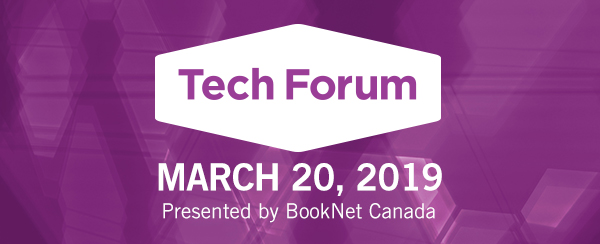Each year, Booknet Canada hosts Tech Forum, the largest tech-focused professional development event in the Canadian publishing industry. Like the other conferences and industry events we’ve been attending, panelists were thinking about diversity, inclusion, data, and collaboration. Here are some of our takeaways from Tech Forum 2019’s speakers discussing top-of-mind challenges and trends.

Moving from Diversity to Inclusion
The Canadian publishing industry is no stranger to the conversation around diversity and inclusion in the book world. Tech Forum’s keynote speaker Ritu Bhasin of bhasin consulting inc., addressed this in her presentation, “Disrupting Bias: Overcoming our Discomfort with Differences.”
Diversity, she said, is only one step toward inclusion. Despite best intentions, diversity is a numbers game – counting how many different “kinds” of people are in an institution. Diversity doesn’t ensure that individuals who have been marginalized in the publishing industry and elsewhere are encouraged to be their authentic selves or given the same opportunities as others. For example, diversity means advertising that a certain percentage of a publisher’s list is written by women or POC authors. Inclusion means ensuring that a publisher spends equal resources (or greater resources) to market its diverse list to give those books a better shot in the market.
Bhasin also mentioned that in 15 years Canada’s population is projected to be 35-40% POC and 6% indigenous. So, not only is it an ethical and social imperative to make a more inclusive industry, it is also best business practices.
We also saw questions of inclusion and diversity addressed at London Book Fair. Read our recap here.
Tools for Data-Driven Decisions
Jordyn Martinez, sales representative at Simon & Schuster Canada, explained how to use data to encourage more book sales in her talk, “Finding the Kernel: Data Driven Sales Tactics to Really Sell Your Book.”
She suggested that publishers use Google Trends, which analyzes the top search queries across customizable topics or categories. This useful tool can be used to discover data that can have a major impact on the marketing of your book, especially when it comes to advertising.
Take, for example, regional trends. If you’re hoping to sell your summer beach read, you can use Google Trends to discover which state or province is most likely to be searching for this term. This can help you hone in on how to spend your advertising dollars and get the most bang for your buck. With Google Trends, you can learn that Floridians are much more likely to be searching for beach reads than people living in Alaska, making it a far more sensible decision to start a beach-focused ad campaign in Florida.
Google Trends can also help you pick the optimal publication date for a title, as well. If you’re wondering when you should publish a steamy romance, Google Trends can tell you that the week after Valentine’s Day is the most popular for these types of searches.
Building Bridges Between Publishers and Booksellers
While publishers and booksellers are aligned in goal, we learned during “Building Bridges, Not Walls: Successful Publishing & Retailing Collaborations,” that they do run into issues executing their shared goal of helping books find their audiences.
Laura Ash from Another Story Bookshop told us that as a bookseller, she sometimes has a hard time restocking bestsellers, causing a critical gap between when the book is at its most popular and when they actually have it in stock. If books are out of stock, today’s readers aren’t willing to wait until the bookstore has it again. Instead, they’ll turn to Amazon or a convenient big box store.
Chris Hall of McNally Robinson said that he’s finding it more and more difficult to spot best sellers. But, he noted that for him, a bookseller’s job to generate their own bestsellers. He suggested using engaging displays, interesting newsletters, and targeting the local demographic to set a book up for success. For example, at his own branch in The Forks in Winnipeg, which has a rich history as an early Aboriginal settlement, they’ve worked extra hard to devote shelf space and hand-sell titles by local indigenous authors.
For more of our conference season coverage, check out our recap of London Book Fair and Livre Paris, as well as recent events from BIGNY and the Future of Media. And, keep up with NetGalley Insights conference coverage by signing up for our weekly newsletter!
